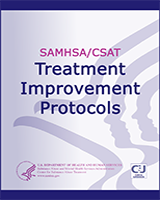NCBI Bookshelf. A service of the National Library of Medicine, National Institutes of Health.
This publication is provided for historical reference only and the information may be out of date.
This TIP, Medication-Assisted Treatment for Opioid Addiction in Opioid Treatment Programs, incorporates the many changes in medication-assisted treatment for opioid addiction (MAT) that have occurred over the most active decade of change since the inception of this treatment modality approximately 40 years ago. The TIP describes the nature and dimensions of opioid use disorders and their treatment in the United States, including basic principles of MAT and historical and regulatory developments. It presents consensus panel recommendations and evidence-based best practices for treatment of opioid addiction in opioid treatment programs (OTPs). It also examines related medical, psychiatric, sociological, and substance use disorders and their treatment as part of a comprehensive maintenance treatment program. The TIP includes a discussion of the ethical considerations that arise in most OTPs, and it provides a useful summary of areas for emphasis in successfully administering MAT in OTPs.
Contents
- Acknowledgments
- What Is a TIP?
- Consensus Panel
- Editorial Advisory Board
- Consensus Panelists
- KAP Expert Panel and Federal Government Participants
- Foreword
- Executive Summary
- Chapter 1. Introduction
- Chapter 2. History of Medication-Assisted Treatment for Opioid Addiction
- Chapter 3. Pharmacology of Medications Used To Treat Opioid Addiction
- Chapter 4. Initial Screening, Admission Procedures, and Assessment Techniques
- Chapter 5. Clinical Pharmacotherapy
- Chapter 6. Patient-Treatment Matching: Types of Services and Levels of Care
- Chapter 7. Phases of Treatment
- Chapter 8. Approaches to Providing Comprehensive Care and Maximizing Patient Retention
- Chapter 9. Drug Testing as a Tool
- Chapter 10. Associated Medical Problems in Patients Who Are Opioid Addicted
- Chapter 11. Treatment of Multiple Substance Use
- Chapter 12. Treatment of Co-Occurring Disorders
- Prevalence of Co-Occurring Disorders
- Motivation for Treatment and Co-Occurring Disorders
- Etiology of Co-Occurring Disorders
- Screening for Co-Occurring Disorders
- Making and Confirming a Psychiatric Diagnosis
- Prognosis for Patients With Co-Occurring Disorders
- Treatment Issues
- Appendix 12-A. Internet Resources for Accessing Psychiatric Instruments
- Chapter 13. Medication-Assisted Treatment for Opioid Addiction During Pregnancy
- Acceptance of Methadone Maintenance as the Standard of Care
- Diagnosing Opioid Addiction in Pregnant Patients
- Medical and Obstetrical Concerns and Complications
- Methadone Dosage and Management
- Postpartum Treatment of Mothers in MAT
- Breast-Feeding
- Effects on Neonatal Outcome
- Use of Buprenorphine During Pregnancy
- Importance of Integrated, Comprehensive Services
- Nutrition Assessment, Counseling, and Assistance
- Chapter 14. Administrative Considerations
- Appendix A: Bibliography
- Appendix B: Abbreviations and Acronyms
- Appendix C: Glossary
- Appendix D: Ethical Considerations in MAT
- Appendix E: Resource Panel
- Appendix F: Field Reviewers
Suggested citation:
Center for Substance Abuse Treatment. Medication-Assisted Treatment for Opioid Addiction in Opioid Treatment Programs. Treatment Improvement Protocol (TIP) Series 43. DHHS Publication No. (SMA) 12-4214. Rockville, MD: Substance Abuse and Mental Health Services Administration, 2005.
The opinions expressed herein are the views of the consensus panel members and do not necessarily reflect the official position of CSAT, SAMHSA, or DHHS. No official support of or endorsement by CSAT, SAMHSA, or DHHS for these opinions or for particular instruments, software, or resources described in this document is intended or should be inferred. The guidelines in this document should not be considered substitutes for individualized client care and treatment decisions.
- Tailoring services in opioid treatment programs for patients involved in America's criminal justice system: national associations and variation by state and Medicaid expansion status.[Subst Abuse Treat Prev Policy....]Tailoring services in opioid treatment programs for patients involved in America's criminal justice system: national associations and variation by state and Medicaid expansion status.Pro G, Montgomery BEE, Zaller N. Subst Abuse Treat Prev Policy. 2021 Jun 19; 16(1):50. Epub 2021 Jun 19.
- Characterizing variability in state-level regulations governing opioid treatment programs.[J Subst Abuse Treat. 2020]Characterizing variability in state-level regulations governing opioid treatment programs.Jackson JR, Harle CA, Silverman RD, Simon K, Menachemi N. J Subst Abuse Treat. 2020 Aug; 115:108008. Epub 2020 Apr 24.
- Characteristics and current clinical practices of opioid treatment programs in the United States.[Drug Alcohol Depend. 2019]Characteristics and current clinical practices of opioid treatment programs in the United States.Jones CM, Byrd DJ, Clarke TJ, Campbell TB, Ohuoha C, McCance-Katz EF. Drug Alcohol Depend. 2019 Dec 1; 205:107616. Epub 2019 Oct 17.
- Review A review of a national training initiative to increase provider use of MAT to address the opioid epidemic.[Am J Addict. 2016]Review A review of a national training initiative to increase provider use of MAT to address the opioid epidemic.Levin FR, Bisaga A, Sullivan MA, Williams AR, Cates-Wessel K. Am J Addict. 2016 Dec; 25(8):603-609. Epub 2016 Nov 2.
- Statement of the American Society Of Addiction Medicine Consensus Panel on the use of buprenorphine in office-based treatment of opioid addiction.[J Addict Med. 2011]Statement of the American Society Of Addiction Medicine Consensus Panel on the use of buprenorphine in office-based treatment of opioid addiction.Kraus ML, Alford DP, Kotz MM, Levounis P, Mandell TW, Meyer M, Salsitz EA, Wetterau N, Wyatt SA, American Society Of Addiction Medicine. J Addict Med. 2011 Dec; 5(4):254-63.
- Medication-Assisted Treatment for Opioid Addiction in Opioid Treatment ProgramsMedication-Assisted Treatment for Opioid Addiction in Opioid Treatment Programs
- Comprehensive Case Management for Substance Abuse TreatmentComprehensive Case Management for Substance Abuse Treatment
- Improving Cultural CompetenceImproving Cultural Competence
Your browsing activity is empty.
Activity recording is turned off.
See more...
